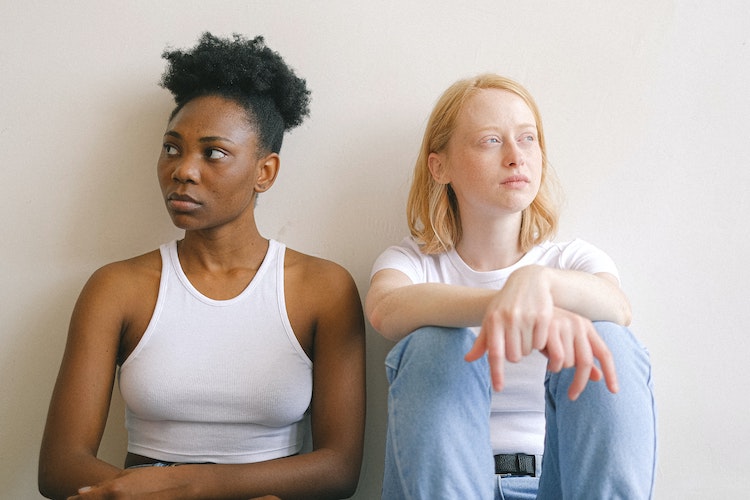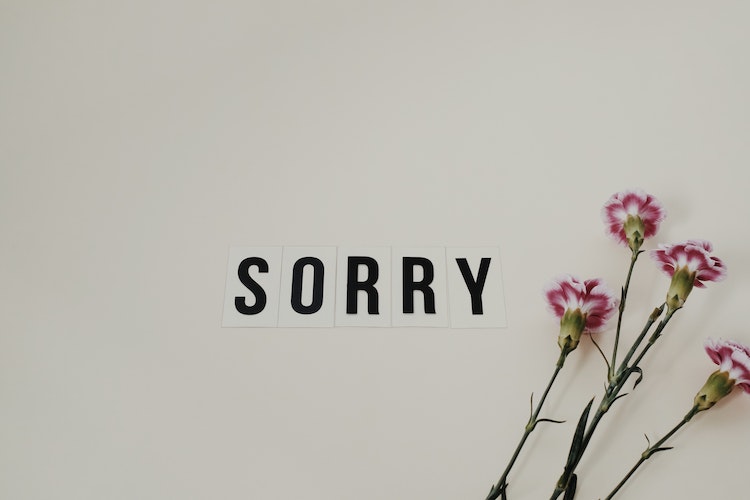
I think lots of women have an apology reflex.
“Sorry,” we say when someone bumps into us on the train platform. “Sorry to ask,” or, “Sorry to interrupt,” Sorry for taking up space, it seems.
It’s weird that I can apologise for tiny things a dozen times a day, but apologising for big stuff? That’s hard.
Apologising when you have really and truly messed up is embarrassing. It’s making yourself vulnerable to someone agreeing with you. “Yes, you’re an idiot and a terrible person.”
But if we’re going to be anything approaching a role model to our kids, it’s a necessary evil. In an alarming sign that I’m becoming an official grown-up, this year I’ve been making apologies all over the place.
2020: The Apology Tour
Maybe it’s just me, but being stuck at home this year left me with a LOT of free time.
And what I noticed was there were several episodes in my life that I look back on with genuine regret. As in, I really did not handle those situations in a good way, and as a result I hurt other people.
It’s easy for me to come up with justifications. To say well, she did this, or he said that, and it’s TOTALLY justified that I was unkind, or impatient, or judgmental. But I suppose what I started to realise lately is that someone else behaving poorly doesn’t take away the fact that I am not proud of my own behaviour.
So why not apologise?
And that’s what I did. I went to Etsy and picked out a bunch of different apology cards. I sent cards to half a dozen people, along with notes (and cake, where appropriate). I just basically said, “No matter the circumstances, I know that I was a dick, and I hurt you. I should have done better, and I am sorry.”

What I Learned about Apologies
Offering apologies has actually turned out to be very cathartic and it’s taught me a lot about myself.
You Can Explain without Justifying
I think it’s important for an apology to be unambiguous. If you’re saying, “I’m sorry I was angry but you did X,” then you’re not apologising, you’re justifying. Similarly, “I am sorry you felt that..” isn’t a sincere apology.
I do think it’s okay to explain. Sometimes it’s important. Like if you ended a friendship or relationship without explanation, it can help the other person to understand why you made that choice. Just don’t confuse your explanation with a justification. It’s about saying, “This is why I did that, but I know that it wasn’t okay. My behaviour was unfair and hurtful, and I am sorry.”
No Expectation Apologies
I think it’s important to apologise because you are remorseful, not because it’s a transaction.
Don’t apologise because you want someone back in your life, and this is how to achieve that. Don’t apologise because you think that means they will apologise to you. This isn’t a transaction and you can’t demand anything in return for your apology. I think an apology should be about ME expressing remorse, regardless of the outcome.
Don’t Apologise for Existing
There are things it’s important to apologise for. And there are some things you should never apologise for. I don’t feel any need to apologise for my feelings, for example. I am entitled to think and feel whatever I choose, and I can’t apologise for simply existing, and being myself.
But I will apologise if those things led me to behave unfairly towards someone, or to lash out and say something hurtful.

Forgiveness Starts with You
I’m lucky that many of the people who I apologised to accepted my apology. That’s a really good feeling. But it’s not guaranteed.
I apologised to a family member following a disagreement, but they chose not to acknowledge or accept my apology. It’s a shame, but it is what it is. I am not a terrible, worthless person and neither are you. We’re all just human, making mistakes and trying to learn as we go. Whether or not someone else forgives you, I think if you offer a sincere apology and learn from an experience, then what’s really important is that you forgive yourself.
Apologies Almost Always Work Out
The biggest thing I’ve learned is that if I can swallow my pride and offer a sincere apology, it always just … helps.
In some cases, I’ve mended fenced and fixed awkward relationships and that means I get to have some lovely people in my life on a more regular basis. There will be times when you apologise to someone that you don’t want back in your life for perfectly good reasons. Still, apologising in those circumstances still felt like lifting a weight off my shoulders. Because I know that I no longer feel uncomfortable thinking about that person, or embarrassed that my behaviour didn’t match up to my expectations of myself.
Let’s be honest. I’m definitely still a work in progress. Most of us are. It’s hard to admit when we’ve got things wrong, and I am horrible at confrontation of any k. But I like to think this year has given me the opportunity to get a little better at this stuff. Do you have any tips for effective apologies?




